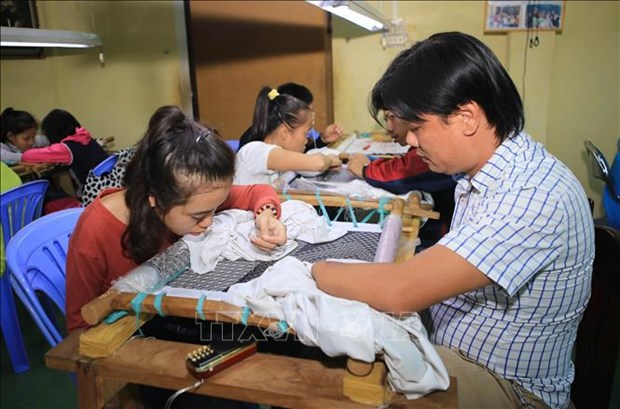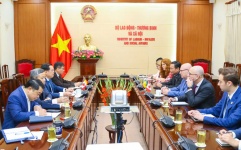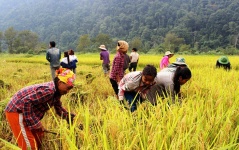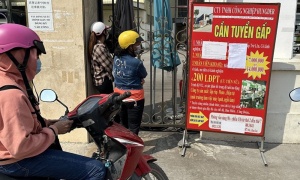For persons with disabilities, employment is the key: officials
The National Committee for Persons with Disabilities plans to support training and roll out livelihood and startup models for about 20,000 people with disabilities this year, according to Deputy Minister of Labour, Invalids and Social Affairs Nguyen Van Hoi.

Statistics showed that most of the disabled people are poor, neither attend school nor have academic degrees, are of the working age and live in rural areas. They help their families with farming, forestry and fishery activities, with low incomes.
The Party, State and people have paid heed to the group, as reflected through the adoption of many relevant policies, and the allocation of resources for the implementation of the policies, programmes and projects.
As a result, more than 1.1 million disabled people have received monthly social allowances and free health insurance cards.
Article 4 of the Law on Persons with Disabilities prescribes that persons with disabilities are guaranteed to participate on an equal basis in social activities; live independently and integrate into the community; enjoy exemption from or reduction of certain contributions to social activities; to be provided with healthcare, functional rehabilitation, education, vocational training, employment, legal assistance, access to public facilities, means of transport, information technology and cultural, sports, tourist and other services suitable to their forms and degrees of disability, and others in line with legal regulations.
Notably, people with disabilities who face financial difficulties have received legal assistance through consultation and participation in litigation.
Pham Thi Hai Ha, Deputy Director of the Ministry of Labour, Invalids and Social Affairs (MoLISA)' Department of Social Protection, said more than 28.73 trillion VND (1.22 billion USD) was earmarked from the state budget last year for the implementation of the government’s Decree No. 20/2021/ND-CP dated March 15, 2021 on support to social allowance beneficiaries, and another 480 billion VND for the roll-out of support policies towards disabled people in terms of education.
Apart from the state budget, relevant organisations and associations have also worked hard to mobilise resources from different economic sectors in order to improve living standards of the disabled people.
The 2010 Law on Persons with Disabilities also prescribes vocational training and employment for them.
Vietnam ratified the UN Convention on the Rights of Persons with Disabilities and the International Labour Organisation (ILO)’s Convention 159 on Vocational Rehabilitation and Employment for Disabled Persons.
The Law on Vocational Education also devotes one chapter to vocational training for disabled people, helping them be self-employed or seek employment, thus stabilising their lives.
The State has pledged to provide financial support and other incentives for the institutions that offer vocational education to the disabled.
Disabled self-employed people and households that create jobs for the disabled can access preferential loans in service of their production and business, and receive assistance in terms of both technology and production consumption in line with the Government’s regulations.
Each year, some 19,000 disabled people benefit from such vocational training programmes, more than 20,000 are supported in job seeking and nearly 40,000 access preferential loans.
For the role of employers, the Ordinance on Disabled Persons stipulates that the disabled should account for 2-3% of the workforce of each enterprise. If not, the businesses must monthly contribute to the employment fund for people with disabilities an amount equivalent to the minimum wage prescribed by the State for the disabled employees.
An ILO report showed that Vietnam loses 3% of GDP by not employing people with disabilities in the labour market.
Director of the Social Protection Department To Duc said the legal system related to people with disabilities will be reviewed this year, with a focus on breakthrough policies to enhance their accessibility to vocational education, and create jobs and stable livelihoods for them.
The MoLISA also coordinate with relevant ministries, agencies and localities to build a dossier on amending and supplementing the Law on Persons with Disabilities, the Employment Law, and the Law on Social Insurance, in which suitable policies for the disabled will be integrated and supplemented, he added./. VNA
-
 Over 10,000 women and children in Ninh Thuận and Cà Mau access clean water and better livelihoods
21-02-2025 14:36 01
Over 10,000 women and children in Ninh Thuận and Cà Mau access clean water and better livelihoods
21-02-2025 14:36 01 -
 Promoting labor cooperation between Vietnam and the Province of Saskatchewan (Canada)
18-02-2025 15:18 18
Promoting labor cooperation between Vietnam and the Province of Saskatchewan (Canada)
18-02-2025 15:18 18 -
 Multidimensional poverty rate nationwide drops to 4.06% in 2024
12-02-2025 15:45 16
Multidimensional poverty rate nationwide drops to 4.06% in 2024
12-02-2025 15:45 16
-
 9 in 10 Vietnamese consumers say a healthier diet is important to support mental and physical health – Herbalife Asia Pacific survey
26-12-2024 13:52 47
9 in 10 Vietnamese consumers say a healthier diet is important to support mental and physical health – Herbalife Asia Pacific survey
26-12-2024 13:52 47 -
 International migrants are vital force in the global labour market
19-12-2024 14:25 00
International migrants are vital force in the global labour market
19-12-2024 14:25 00 -
 2024 Vietnam Labour Day in Japan held
11-12-2024 11:02 18
2024 Vietnam Labour Day in Japan held
11-12-2024 11:02 18
- Herbalife Vietnam won the Corporate Social Responsibility Recognition Award by AmCham for the seventh consecutive year
- Herbalife Vietnam Expands Casa Herbalife Program to 15 Locations Nationwide To Help Improve Daily Nutrition For People In Need
- Deputy Minister Le Van Thanh received the Director of the Global Better Work Program











